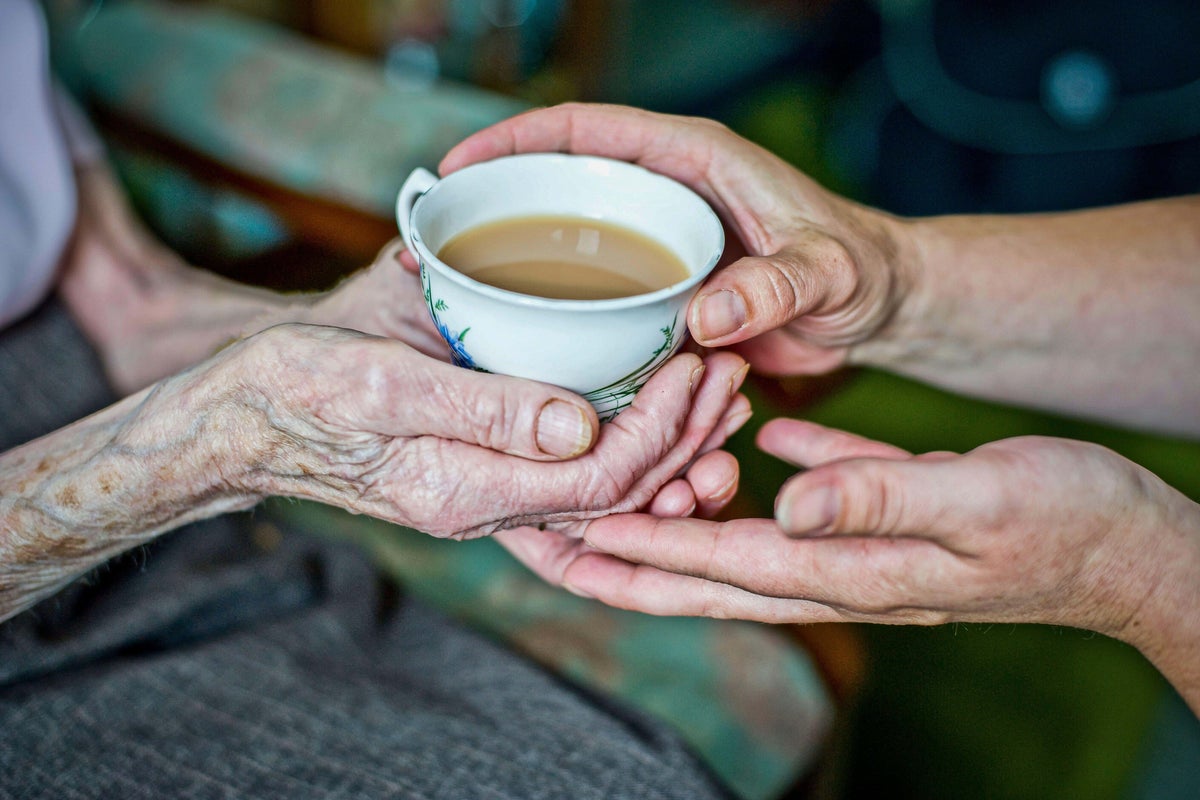Lifestyle
UK Sees 70% Surge in Unpaid Carers, Care System Under Strain

The number of unpaid carers in the UK has surged by over 70% in the past two decades, reaching a staggering 1.9 million individuals in 2023/24. This increase reflects a growing crisis within the country’s care system, which has struggled to keep pace with rising demand and diminishing resources. According to a recent report released by the Joseph Rowntree Foundation and the Institute for Public Policy Research (IPPR), the number of people providing 35 hours or more of care each week has jumped from 1.1 million in 2003/04 to the current figure.
Martin McGowan, aged 72, and his wife Sue, aged 69, exemplify the challenges faced by many families. The couple has spent nearly three decades caring for one another due to chronic health issues. Mr. McGowan began experiencing heart problems in 1995, which drastically changed his ability to work and care for his family. His wife has undergone more than 30 surgeries over the years, beginning after a caesarean section during the birth of their son.
The McGowans rarely rely on local authorities for care, but they have felt the impact of reduced support services. “My wife used to go to day groups that were useful and very helpful for her, but they were all cut down. It’s been cut right across the board,” Mr. McGowan remarked. He added that while authorities discuss care in the community, the essential services have dwindled without replacements.
The report highlights a sharp increase in requests for care support, rising from 1.8 million in 2015/16 to 2.1 million in 2023/24. Notably, the number of working-age adults requiring care has grown by 31.5%. The findings indicate that unpaid care, often provided by family members, is increasingly relied upon to fill significant gaps in a strained social care system.
Mr. McGowan recounted a frustrating experience in which he was unable to be discharged from the hospital due to a lack of available social workers during the Easter weekend. “I couldn’t be released until the following Thursday or Friday, which means I was blocking a bed which I didn’t need,” he said, emphasizing the inefficiencies within the current system.
In response to the findings, the report advocates for government intervention to support unpaid carers through measures such as care leave, workplace rights, and income protection as part of a proposed National Care Service (NCS). Sir Ed Davey, leader of the Liberal Democrats, shared his own experiences as a carer, stating, “Most care happens not in care homes but in people’s homes; provided not by paid care staff but by family members and other loved ones.” He called for a broader discussion around care that includes the perspective of unpaid carers.
Abby Jitendra, a principal policy adviser at the Joseph Rowntree Foundation and author of the IPPR discussion paper, emphasized the urgent need for reform. “Millions of us are carers or need care, and this number will surge in the future. But families are being left to navigate a neglected system – paying sky-high costs, sacrificing work to care, and too often going without the support they need,” she stated. Jitendra urged for a care system that operates like a public service: universal, affordable, reliable, and fair.
Dr. Parth Patel, associate director at IPPR, acknowledged the pressing question of who will provide care in the future. He remarked, “This is not just a question of tax and spend, but of dignity and mutual obligation.” He highlighted the need for policies that recognize and support the role of family caregivers, advocating for flexible working hours and greater commitments to high-quality care services.
The report serves as a clarion call for systemic changes to address the growing reliance on unpaid caregivers in the UK. Without urgent action, it warns that the current care system will continue to strain under increasing demands, leaving countless families to shoulder the burden alone.
-

 Health3 months ago
Health3 months agoNeurologist Warns Excessive Use of Supplements Can Harm Brain
-

 Health3 months ago
Health3 months agoFiona Phillips’ Husband Shares Heartfelt Update on Her Alzheimer’s Journey
-

 Science1 month ago
Science1 month agoBrian Cox Addresses Claims of Alien Probe in 3I/ATLAS Discovery
-

 Science1 month ago
Science1 month agoNASA Investigates Unusual Comet 3I/ATLAS; New Findings Emerge
-

 Science1 month ago
Science1 month agoScientists Examine 3I/ATLAS: Alien Artifact or Cosmic Oddity?
-

 Science1 month ago
Science1 month agoNASA Investigates Speedy Object 3I/ATLAS, Sparking Speculation
-

 Entertainment5 months ago
Entertainment5 months agoKerry Katona Discusses Future Baby Plans and Brian McFadden’s Wedding
-

 Entertainment4 months ago
Entertainment4 months agoEmmerdale Faces Tension as Dylan and April’s Lives Hang in the Balance
-

 World3 months ago
World3 months agoCole Palmer’s Cryptic Message to Kobbie Mainoo Following Loan Talks
-

 Science1 month ago
Science1 month agoNASA Scientists Explore Origins of 3I/ATLAS, a Fast-Moving Visitor
-

 Entertainment2 months ago
Entertainment2 months agoLewis Cope Addresses Accusations of Dance Training Advantage
-

 Entertainment3 months ago
Entertainment3 months agoMajor Cast Changes at Coronation Street: Exits and Returns in 2025









